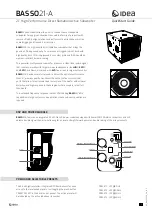
12
Setting Up the STS
There is no escaping the fact that the STS is a large subwoofer. That being said,
it is designed to have remarkable installation flexibility for something so large. It
may be used standing upright, or laying down on its broad side, in which case it
can be built into a set of risers or as part of a “stage” in front of the screen.
The STS also includes three locations for the exit of the Regenerative Transmis-
sion Line
™
. As shipped from the factory, the vent is located on the end of the
STS enclosure. However, if your location would be better served by the vent
being on one side or the other, your dealer can easily swap the grille for the
solid aluminum plate that covers the desired exit location. There is no difference
in performance, but often a great difference in application flexibility.
The STS is a passive subwoofer, meaning that it does not come with a “plate”
amplifier or internal crossover. The crossover function is normally provided by
the surround preamplifier in the system, or by the SC-1 (which is a required part
of any system that uses an STS). Similarly, the amplifier is one channel of what-
ever is being used for the rest of the system, or perhaps a dedicated, high power
amplifier, depending on your application.
The sensitivity of the STS is quite high, at 101 dB/2.83V/1m (2.83V is one watt
at 8Ω). So you do not necessarily have to have a huge, powerful amplifier to
drive the STS. However, if you want to fill an unusually large space, the STS can
handle 5000 watts of power and deliver in excess of 130 dB at 20 Hz (again,
measured at one meter).
We recommend a powerful amplifier for the best results, since the STS sounds
so good that you will be inclined to turn it up. You cannot go wrong by having
too much power.
Содержание Sage STS
Страница 1: ...Owner s Manual Sage STS High Output Subwoofer ...
Страница 3: ......
Страница 18: ...18 STS Dimensions ...
Страница 19: ...19 Notes ...






































